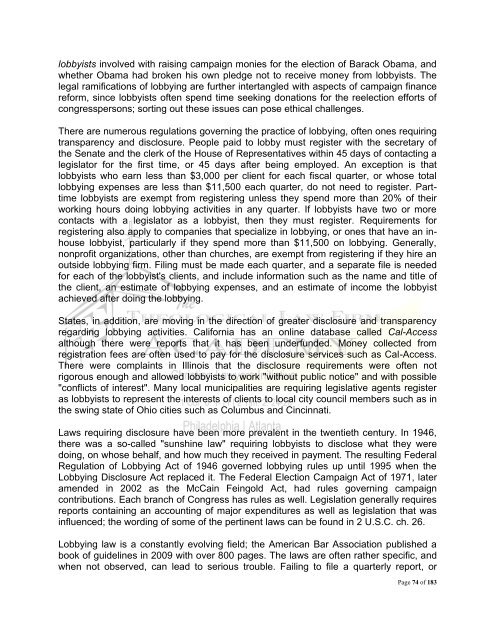The 508(c)(1)(a) Initiative Workshop
The 508(c)(1)(a) Initiative Workshop
The 508(c)(1)(a) Initiative Workshop
Create successful ePaper yourself
Turn your PDF publications into a flip-book with our unique Google optimized e-Paper software.
lobbyists involved with raising campaign monies for the election of Barack Obama, and<br />
whether Obama had broken his own pledge not to receive money from lobbyists. <strong>The</strong><br />
legal ramifications of lobbying are further intertangled with aspects of campaign finance<br />
reform, since lobbyists often spend time seeking donations for the reelection efforts of<br />
congresspersons; sorting out these issues can pose ethical challenges.<br />
<strong>The</strong>re are numerous regulations governing the practice of lobbying, often ones requiring<br />
transparency and disclosure. People paid to lobby must register with the secretary of<br />
the Senate and the clerk of the House of Representatives within 45 days of contacting a<br />
legislator for the first time, or 45 days after being employed. An exception is that<br />
lobbyists who earn less than $3,000 per client for each fiscal quarter, or whose total<br />
lobbying expenses are less than $11,500 each quarter, do not need to register. Parttime<br />
lobbyists are exempt from registering unless they spend more than 20% of their<br />
working hours doing lobbying activities in any quarter. If lobbyists have two or more<br />
contacts with a legislator as a lobbyist, then they must register. Requirements for<br />
registering also apply to companies that specialize in lobbying, or ones that have an inhouse<br />
lobbyist, particularly if they spend more than $11,500 on lobbying. Generally,<br />
nonprofit organizations, other than churches, are exempt from registering if they hire an<br />
outside lobbying firm. Filing must be made each quarter, and a separate file is needed<br />
for each of the lobbyist's clients, and include information such as the name and title of<br />
the client, an estimate of lobbying expenses, and an estimate of income the lobbyist<br />
achieved after doing the lobbying.<br />
States, in addition, are moving in the direction of greater disclosure and transparency<br />
regarding lobbying activities. California has an online database called Cal-Access<br />
although there were reports that it has been underfunded. Money collected from<br />
registration fees are often used to pay for the disclosure services such as Cal-Access.<br />
<strong>The</strong>re were complaints in Illinois that the disclosure requirements were often not<br />
rigorous enough and allowed lobbyists to work "without public notice" and with possible<br />
"conflicts of interest". Many local municipalities are requiring legislative agents register<br />
as lobbyists to represent the interests of clients to local city council members such as in<br />
the swing state of Ohio cities such as Columbus and Cincinnati.<br />
Laws requiring disclosure have been more prevalent in the twentieth century. In 1946,<br />
there was a so-called "sunshine law" requiring lobbyists to disclose what they were<br />
doing, on whose behalf, and how much they received in payment. <strong>The</strong> resulting Federal<br />
Regulation of Lobbying Act of 1946 governed lobbying rules up until 1995 when the<br />
Lobbying Disclosure Act replaced it. <strong>The</strong> Federal Election Campaign Act of 1971, later<br />
amended in 2002 as the McCain Feingold Act, had rules governing campaign<br />
contributions. Each branch of Congress has rules as well. Legislation generally requires<br />
reports containing an accounting of major expenditures as well as legislation that was<br />
influenced; the wording of some of the pertinent laws can be found in 2 U.S.C. ch. 26.<br />
Lobbying law is a constantly evolving field; the American Bar Association published a<br />
book of guidelines in 2009 with over 800 pages. <strong>The</strong> laws are often rather specific, and<br />
when not observed, can lead to serious trouble. Failing to file a quarterly report, or<br />
Page 74 of 183
















